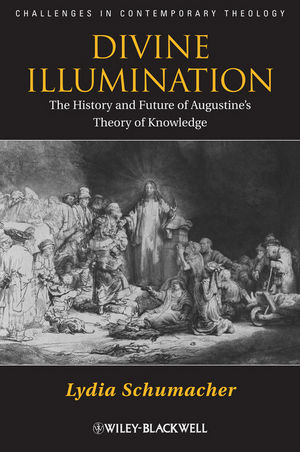
Divine Illumination
Wiley-Blackwell (Verlag)
978-0-470-65742-3 (ISBN)
DIVINE ILLUMINATION “An important and ground-breaking study which links growing interest in Augustine and medieval philosophy with cutting-edge questions in contemporary philosophy of religion, particularly concerning epistemology and the ‘rationality’ of religion.”
Janet Soskice, University of Cambridge
“In this lucidly argued and solidly documented study, Schumacher uncovers the roots of problems notoriously besetting modern theories of knowledge in conflicting medieval interpretations of Augustine’s assumptions about knowledge as divine illumination: an intriguing thesis, which she handles with delicacy and flair.”
Fergus Kerr, O.P. University of Edinburgh
“Challenges the traditional history of theories of knowledge. A bold and provocative reading.”
Olivier Boulnois, École Pratique des Hautes Études (University of Paris, Sorbonne)
Divine Illumination offers an original interpretation of Augustine’s theory of knowledge, tracing its development in the work of medieval thinkers such as Anselm, Bonaventure, Thomas Aquinas, and John Duns Scotus. Although Scotus is often deemed responsible for finally pronouncing Augustine’s longstanding illumination account untenable, Schumacher shows that he only rejected a version that was the byproduct of a shift in the understanding of illumination and knowledge more generally within the thirteenth-century Franciscan school of thought.
To reckon with the challenges in contemporary thought on knowledge that were partly made possible by this shift, Schumacher recommends relearning a way of thinking about knowledge that was familiar to Augustine and those who worked in continuity with him.
Her book thus anticipates a new approach to dealing with debates in contemporary epistemology, philosophy of religion, and theology, even while correcting some longstanding assumptions about Augustine and his most significant medieval readers.
Lydia Schumacher is Research Fellow and a member of the Faculty of Theology at the University of Oxford.
Acknowledgments ix
Editions x
Abbreviations xii
Introduction 1
Augustine on Divine Illumination 4
Interpretations of Divine Illumination in Augustine’s Thought 7
Interpretations of Divine Illumination in Medieval Thought 14
Re-interpreting the History of Augustine’s Theory of Knowledge 16
1 Augustine 25
Introduction 25
The Doctrine of God 29
Creation in the Image of God 30
The Fall and Redemption 39
Conforming to the Image of God 42
Divine Illumination 58
2 Anselm 66
Introduction 66
The Image of God 74
Conforming to the Image of God 76
Divine Illumination 82
Anselm the Augustinian 83
3 Divine Illumination in Transition 85
Introduction 85
New Schools 85
New Translations 88
New Religious Challenges 100
New Religious Orders 101
New Intellectual Traditions 103
4 Bonaventure 110
Introduction 110
The Doctrine of God 117
Creation in the Image of God 121
The Fall and Redemption 132
Conforming to the Image of God 135
Divine Illumination 141
Bonaventure the Augustinian? 143
5 Aquinas 154
Introduction 154
The Image of God 160
Conforming to the Image of God 165
Divine Illumination 173
Aquinas the Augustinian 178
6 Divine Illumination in Decline 181
Introduction 181
Peter John Olivi 182
Henry of Ghent 186
John Duns Scotus 194
Augustinian and Franciscan Thought 201
Franciscan and Modern Thought 208
7 The Future of Augustine’s Theory of Knowledge 217
Introduction to a Theological Theory of Knowledge 217
Reason in a Theological Theory of Knowledge 223
Faith in a Theological Theory of Knowledge 226
Conclusion 234
Index 240
| Erscheint lt. Verlag | 18.4.2011 |
|---|---|
| Reihe/Serie | Challenges in Contemporary Theology |
| Verlagsort | Hoboken |
| Sprache | englisch |
| Maße | 160 x 238 mm |
| Gewicht | 531 g |
| Themenwelt | Geisteswissenschaften ► Philosophie ► Erkenntnistheorie / Wissenschaftstheorie |
| Geisteswissenschaften ► Philosophie ► Philosophie des Mittelalters | |
| Geisteswissenschaften ► Religion / Theologie ► Christentum | |
| ISBN-10 | 0-470-65742-1 / 0470657421 |
| ISBN-13 | 978-0-470-65742-3 / 9780470657423 |
| Zustand | Neuware |
| Haben Sie eine Frage zum Produkt? |
aus dem Bereich

![Was heißt Denken?. Vorlesung Wintersemester 1951/52. [Was bedeutet das alles?] - Martin Heidegger](/media/113619842)
